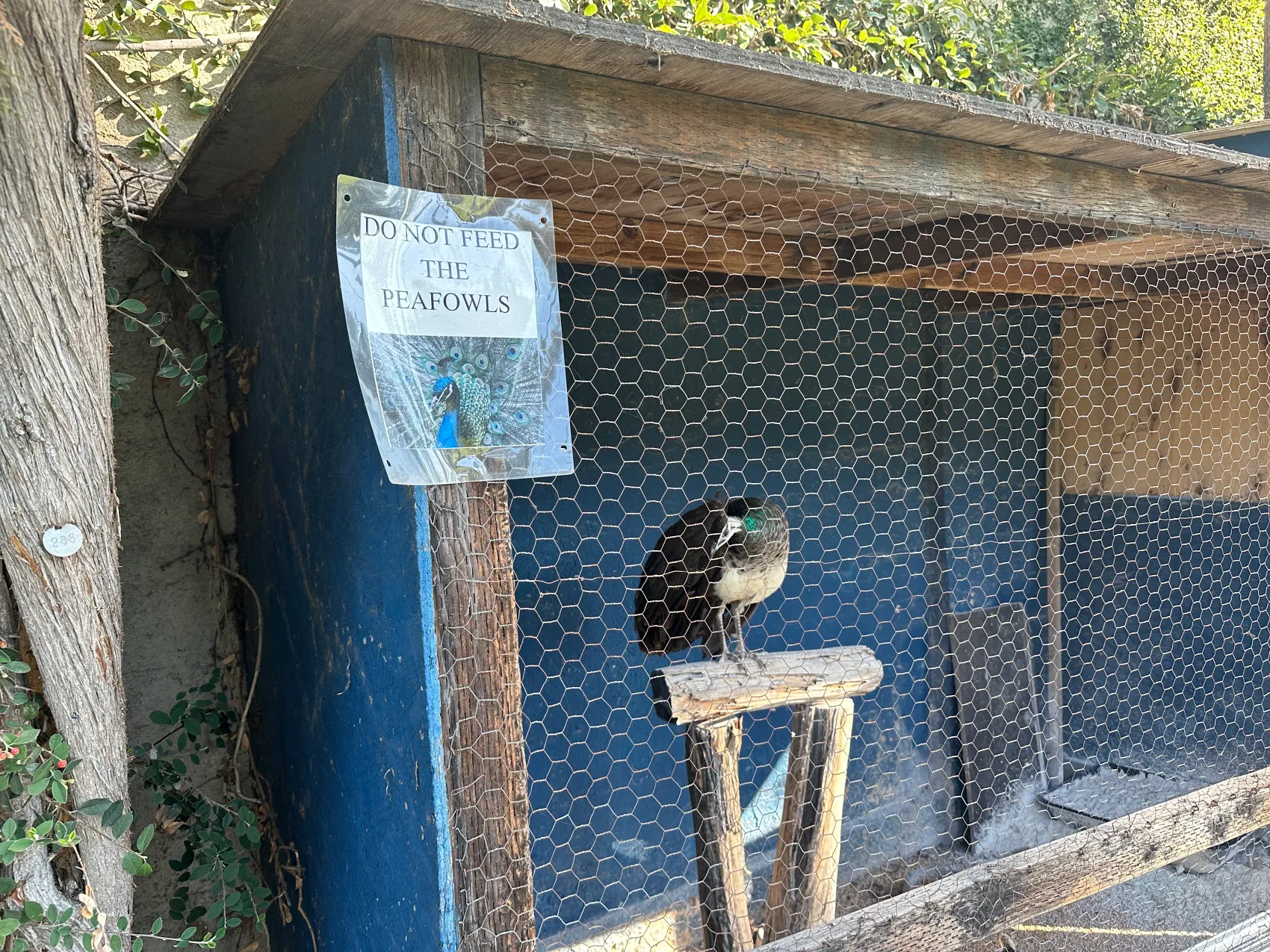Hollywood Forever Cemetery is best known for its famous residents – stars like Judy Garland and Cecil B. DeMille – and its cultural programming, including summer movie screenings, concerts at the Masonic Lodge, and its enormous Dia de Los Muertos festival — one of the largest in the nation. But it’s also a sanctuary for other kinds of life — the furry, feathery and scaly kinds.
“If you go midday, you go by one of the food bowls that has all the cat food, you’ll see the swan, the peacock, and a squirrel all in the same bowl eating together,” observes Eddie Martinez, a funeral director, event coordinator, and lead animal caretaker at Hollywood Forever.
Yes, this cemetery has a lead animal caretaker. And its roster of wild residents runs deep. There are so many, Martinez sometimes loses count.
“We have 53 peafowls. We have about 20 koi. We have maybe close to 40 turtles, and we have five cayuga [duck]s. We have two swans, Helen and Zeus. We have one rabbit. What else do we have?” Martinez pauses the tally and then remembers, “At one point, we had two roosters running around through here.”

A peahen watches over her peachicks inside of an enclosure. Photo by Zacile Rosette/KCRW.
The site is also home to what Martinez describes as “the little cat colony of Hollywood.”
“We have close to 60,” Martinez points out. “They are all feral. They’ve all been here for a very long time. So when the time comes, they know where to go for shelter. They know where to go to find food, to find water. … Most of these cats just came in from outside of the cemetery, and they found it comfortable.”

A feral cat rests on a grave at Hollywood Forever Cemetery. Photo courtesy of Eddie Martinez.
Hollywood Forever President Tyler Cassity says the animals serve a greater purpose on the grounds: “It’s just an antidote to death because they’re so alive. As many times as I see it, I will still stop and wonder when a peacock spreads its feathers and does its little vibrating dance. It always, after however many years, produces a sense of awe. So I think it’s a good place and a good setting to have those symbols of life around us.”
He continues, “These are all things that help keep us on the living side of feeling through what’s going on here, because what’s going on here is the hardest part of life — the end … I just feel better when I see a cat.”

KCRW tenaciously documents the sounds of Hollywood Forever’s dozens of feral cats. Photo by Danielle Chiriguayo/KCRW.
Martinez and his team of family, staff, and volunteers have integrated the animals into the cemetery’s ecosystem. Over the years, they’ve set up hollow, lakeside rocks where the koi fish and turtles can hide, and custom-built cat houses with scratching posts that are nestled between graves. Peacocks even have a multi-story cage that caretakers tuck away on weekends for safety.
The cemetery pays for animal upkeep with the proceeds from biweekly yoga classes offered on the grounds.

A white swan rests near the lake at Hollywood Forever. Photo courtesy of Eddie Martinez.
So where did these animals come from? Cassity says some of them predate the dead residents.
“Where the lake and the Fairbanks Reflection Pool are — are actually natural wetlands swamps,” Cassity explains. “They would have been seasonal wetlands with the water coming straight down from where the Hollywood sign is to here.”
That explains the Egyptian and Canadian geese, which migrate annually, as well as the ducks, who waddled onto the grounds more recently.
Cassity and his business partner Yogu Kanthiah introduced the peacocks more than 20 years ago when they were looking to beautify the place.
That effort, however, brought an avian tale of murder and betrayal. Cassity explains: “We bought a white peacock and a white peahen, [named] them Sid and Nancy, and then four blue peacocks. And all of the blue peacocks killed Sid and mated with Nancy. That has led to all of our various blue and white colors and variations we have here.”
While Hollywood Forever sometimes functions as a wildlife refuge, its staff wants to make one thing clear: This isn’t a place to ditch your unwanted pets. Over the years, as Martinez explains, some have abandoned cats, turtles, and other critters on-site. Most recently, half a dozen kittens were abandoned in September.

About 60 feral cats call Hollywood Forever home. Photo courtesy of Eddie Martinez.

A cat keeps watch near a grave. Photo by Danielle Chiriguayo/KCRW.
“Don’t just show up leaving your pets, thinking this is a better situation for them,” he says. “Most of the time, it’s not. This is a whole new environment for them. They don’t know how to get around. They don’t know where to go.”

Signs around Hollywood Forever warn visitors of the wildlife roaming the grounds. Photo by Danielle Chiriguayo/KCRW.
